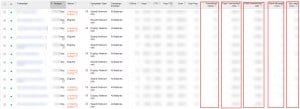Most AdWords accounts use some form of conversion tracking as a metric of success, yet this model is flawed to the point of being meaningless.
I’m not going to go into the specifics of why there may be a disconnect between the ad click and the conversion here, but if you want details read Tracking your AdWords return on investment.
I will, however, show an example that illustrates why conversion tracking is meaningless.
The story of Misguided.
We’ll consider the case of Misguided, a company who sell an online solution for tracking productivity. They’ve been using AdWords for many years, and consider it an important part of their overall marketing strategy. Their AdWords account is managed by an inept ad agency, who’ve assigned Fritter to handle their work.
When Fritter began managing their AdWords, he setup conversion tracking to record anyone who creates an account as a conversion.
So a person searches for a productivity solution, clicks on Misguided’s ad, and has a cookie dropped on their system. Assuming they like what they see, they then open an account and, this is recorded as a conversion.
One of their main campaigns (main #1) rather conveniently receives a round 100 conversions a week.
Fritter thinks he’s quite the AdWords expert, and thanks to reading Tracking your AdWords return on investment, knows that 100 conversions a week won’t be all the conversions, but he uses this data as a useful metric.
So if rc is recorded conversions, nc is non-recorded conversions, and ac is actual conversions:
rc + nc = ac
Fritter hasn’t quite understood the implications of this though, and doesn’t understand that nc may actually be more significant than rc. This is a fundamental mistake on his part.
In the main #1 campaign, for example, even though Fritter has no way of knowing this, there are twice as many non-recorded conversions as there are recorded.
In other words:
100 recorded conversions + 200 non-recorded conversions = 300 actual conversions.
Fritter has been trying to optimise this campaign, and in doing so has disabled a large number of countries that were generating a lot of clicks but absolutely no sales. The result of that is that the campaign is now spending more of its budget in the United States.
One of the implications of this is that there are now a greater proportion of searchers using mobile devices and tablets. As a direct consequence, the number of disconnects in the conversion tracking process has increased.
This results in AdWords reporting 75 recorded conversions a week, instead of the previous 100.
Making a big mistake.
However what Fritter can’t see is that although there are less recorded conversions, there are more non-recorded conversions than before:
75 recorded conversions + 275 non-recorded conversions = 350 actual conversions.
Again, Fritter can’t see this. So what does he do? He forgets the significance of the non-recorded conversions, is swayed by the apparent decline in conversions, and cuts the budget to that campaign.
Fritter can’t know that he’s cutting the budget to the most profitable campaign in the account, mainly because he’s being deceived by the perception of accuracy.
In a sense, you could argue that Google make the misinterpretation easy. The screenshot below shows a total of 11 performance-related metrics. Five of them (highlighted in red) are as good as meaningless.
I’m not suggesting that you pay no attention to reported conversions, as under certain circumstances this information can be quite useful.
But don’t rely on it, and don’t use it as the basis of making decisions on running the account.
The obvious question now is what should you use to determine the success of your AdWords account. The next post will deal with that issue, and give you all the answers you need to make meaningful and accurate decisions.
For now:
Don’t Fritter your account budget with Misguided goals. (Sorry, I couldn’t resist that.)
Unique ideas for your business
The Demystifier puts practical ideas into your hands. You won't find them elsewhere. Original, actionable and insanely effective.




